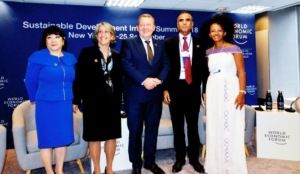On Saturday October 20, Danish PM Lars Løkke Rasmussen celebrated the launch of his Partnering for Green Growth and the Global Goals 2030 (P4G) with heads of state from South Korea, Ethiopia, Vietnam and the Netherlands.
In co-operation with the World Economic Forum (WEF), P4G is mobilising projects and funding in support of the UN goals.
“We need to bring actors together in new ways,” urged Rasmussen during the recent Sustainable Development Impact Summit of the WEF in New York.
Counting down
Confronted with a chilling new UN report that points out that the global community has only 12 years left to limit the catastrophic effects of climate change, Denmark is gearing up.
“We take the lessons learned to other countries,” Rasmussen told CPH POST.
During the UN General Assembly from September 24-28, Rasmussen mobilised eight other countries for his P4G initiative. Together with WEF, the P4G will facilitate public private partnerships within key economic areas in order to deliver on the Paris Climate Agreement and on Sustainable Development Goals (SDG) 2030.

A serious commitment
P4G is not just another “smile to the camera” event. Denmark seriously rocks the boat. In co-operation with Danish pension funds such as Pension Denmark,the Danish SDG Investment Fund was recently topped up by 30 billion kroner destined for the poorest countries in the world.
Most heads of states moan their countries are too poor to take action on climate or other SDG goals. Denmark has proved them wrong. “It is possible to become greener and richer at the same time,” Rasmussen insisted.
“We are a living example of the fact that you can combine economic growth and sustainability.”
“Since I was a child I think we’ve doubled our wealth and at the same time we haven’t increased our emissions at all. That is due to investing heavily in renewables. On windy days, all our electricity is produced by wind turbines, and we are well on the way to reaching our goal of net zero emissions by 2050.”
In order to clear the way – and the air – Denmark is phasing out sales of new petrol and diesel cars and paving the way for about 1 million electric cars on the roads by 2030.
Great connections
“The world is changing and transforming at a rapid speed,” observed WEF founder Klaus Schwab during the SDG Impact Summit.
Schwab might well be the best-connected person of our time. His high-powered, high-priced and highly idealistic meetings, which combine making money and doing good, have gained him the trust of almost all heads of state, major institutions and universities as well as the global business community. The former business professor is one of the very few individuals who is received by the UN Secretary General during the General Assembly – the one week in the year when the heads of 193 member states line up in front of the SG office for a handshake with the UN Chief.
Schwab’s prestigious Davos Club of royalty, heads of state, billionaires and CEOs of billion dollar companies represents up to 80 percent of the world’s resources. This makes Schwab and the WEF one of the most important UN allies – and potent allies are desperately needed in order to generate the 7 trillion dollars needed to achieve the SDG goals.

Drones and biodiversity
Schwab’s vision for a better, more inclusive, fair, peaceful, just and sustainable world and his decades of preaching to the rich and powerful are bearing fruit. During his SDG Impact Summit, 100 initiatives focused on climate change, sustainable development, closing the skills and gender gap, fighting disease, broadening the benefits of trade and protecting the planet’s dwindling biodiversity have been initiated.
A major one is the increased effort of the Tropical Forest Alliance. Jeff Seabright, the chief sustainable officer of Unilever, explained how the consumer goods giant is protecting the tropical rainforest by implementing the sustainable farming of palm oil. During a press briefing, he stated that other major organisations such as the Consumer Goods Forum are also urging their members to protect the planet’s resources.
On October 11, Indian PM Narendra Modi inaugurated the Centre for 4th Industrial Revolution in Delhi. Run by the WEF, the centre will focus on how drones, AI and blockchain can improve the lives of 1.3 billion Indians. Starting in December, the state of Maharashtra and the WEF are starting the largest drone-mapping operation in history.
Assets and mobiles
The WEF Impact Summit was chaired by the Danish PM, Barbara Novick, the vice chair of BlackRock, the Indian mobile mogul Sunil Bharti Mittal, the chair of Bharti Enterprises and Bruktawit Tigabu, the CEO of Whiz Kids.
“We are seeing a shift in allocations. There is an increased interest in all different kinds of sustainable mandates. That includes green bonds – green cash actually,” Novick told CPH POST. “We feel that our job is to bring those products to market, make them available and educate investors on why they are good for their portfolio.”
The world’s biggest asset manager, BlackRock, has approximately 6.29 trillion dollars in assets under management. This green shift could be one of the most powerful tools for rescuing the planet.
Novick is confident that more and more asset owners are willing to pull their money out of oil and gas and put it into wind and solar: “As millennials age, we will see an increase in the acceleration of that trend.”
Tech kids
Mittal also believes in the young generation – and he holds faith in technology. His mobile phone empire Bharti has contributed to the unparalleled economic rise of India in recent decades. “Technology is the solution,” Mittal told CPH Post during a press briefing at the summit. “It is firing up the SDG goals.”
He is confident that smartphones and computers can mitigate the absence of capital and click and chat people in Asia and Africa out of poverty:
“When we put a phone in the hands of the poorest of the poor and connect them, we start to see the magic of technology and innovation come through,” he observed.
“In the next two or three years, almost everybody will have a smartphone in their hand.”
Nevertheless, he still believes in old-fashioned school books. “We have over 300 schools in villages that are our foundation activities. We give free education, meals, computers and school uniforms to 300,000 children.”
All hands on deck
More than 800 people participated in the WEF SDG Impact Summit. Many of them were activists and social entrepreneurs who have developed almost supernatural powers in order to prevent or mitigate catastrophes.
One of them is Runa Khan, the founder of the NGO Friendship. Her hospital ships in Bangladesh are already overloaded because they provide the only medical service for tens of thousands of people. Her team work day and night in order to find a way – and resources – to take care of the Rohingya refugees.
Muhammad Amjad Saqib is another. During the WEF Impact Summit the philanthropist from Pakistan told CPH POST how a widow came to him and asked him for 100 US dollars. Shortly afterwards the women paid him back under one condition: she asked him to lend the money to someone else in need.
Saqib and his friends have now lent more than 600 million dollars to the poorest of the poor – without interest but with a return rate of 99.9 percent and a wealth of joy.
“It’s time for all hands on deck. The world has to collaborate,” commanded California’s governor, Jerry Brown. “Climate change does not recognise sovereignty, it occurs globally.”
That’s why Brown has just signed legislation setting a 100-percent clean electricity goal for his state and issued an executive order establishing a new target to achieve carbon neutrality – by 2045.
One planet
Initiated by French President Emmanuel Macron and orchestrated by Richard Attias & Associates, the One Planet Summit took place during the UN General Assembly and produced some major commitments.
Arnold Schwarzenegger, the former governor of California and ‘Green Terminator’, now flexes his muscles for climate action. His R20 organisation has convinced African leaders to commit 1.4 billion dollars to financing clean infrastructure projects in Africa.
Christophe Nuttall, the executive director of R20, explained that “the fund will work through sub-national, especially city authorities.”
The One Planet Summit also stunned the world with another major commitment: 225 investors with more than 26.3 trillion dollars’ worth of assets under management committed to accelerating climate action.
Making the goals relevant
There is no lack of financial resources and we also have the technical solutions such as capturing CO2 from the air in order to reverse some of the catastrophic effects of carbon dioxide.
However there is a lack of action, knowledge compassion and leadership.
That’s why the work of the UN, WEF, the P4G and One Planet Summit are so vital.















